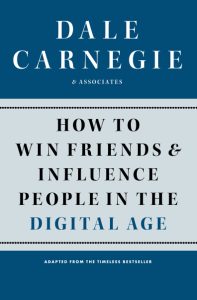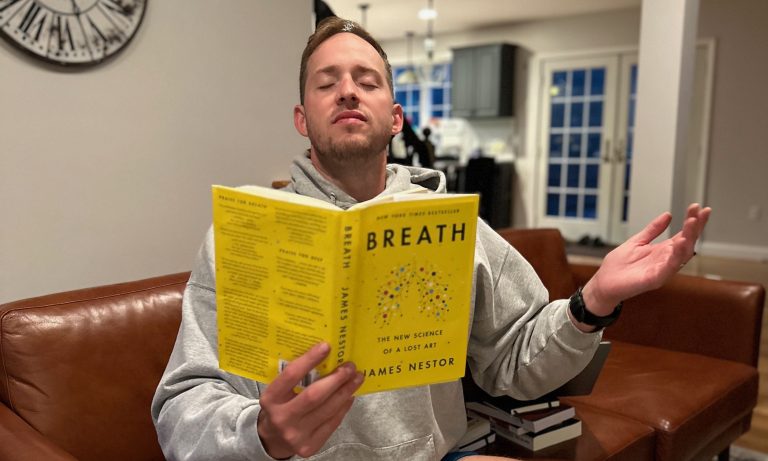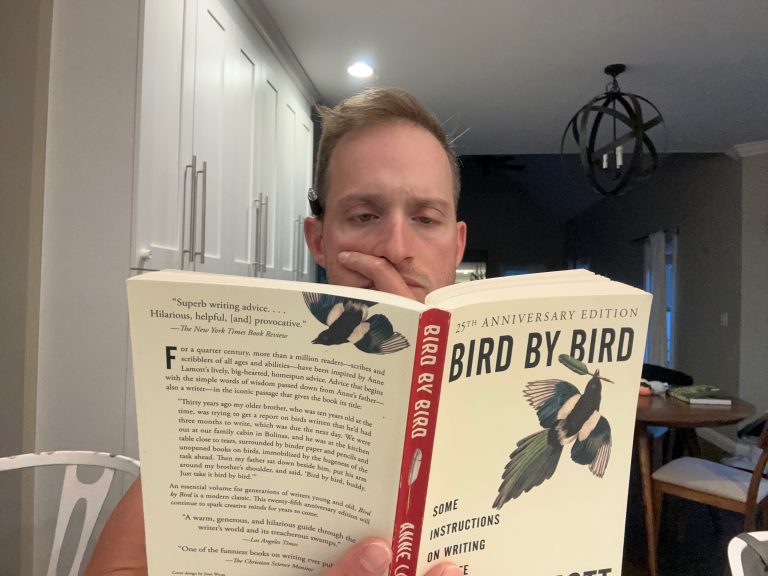How to Win Friends & Influence People in the Digital Age by Dale Carnegie – Book Review

A timeless classic on cultivating relationships revamped for the modern, digital era.
Check it out on Amazon, or my personal favorite, Bookshop.org.
3 Main Takeaways from the Book
- Our ability to connect with others in meaningful ways has always been essential to influencing them; doing so in the digital age, where face-to-face connections rarely occur, has made the matter even more vital.
- While putting out meaningful content is important, interacting with your audience, and those whom you wish to be in your audience is crucial.
- Don’t make it about you, make it about them. Be hyper-focused on uplifting those around you.
Personal Impact
For much of my life, I have downplayed the significance of social media as it relates to creating relationships. I viewed these relationships as fake and mostly superficial, opting to exalt being in person with others. Unfortunately, today, that face-to-face experience can no longer solely be relied upon to develop relationships anymore. Although I still believe it is the best way to get to know someone on the deepest level, it’s time to respect the power of online interactions.
We are truly living in a digital age, where our ability to reach not just those outside our community, but those around the world in a matter of seconds through social media, has exploded. To effectively operate in this world, we must learn how to be digitally friendly, to digitally smile at others, if we are to even begin to develop relationships with them. The mediums of communication to do so are endless, and as such, so are the opportunities to engage with others.
I realized that if I want to have an impact on the health and wellness of families, then I need to focus on having meaningful interactions with them, just as much as I focus on putting out meaningful information for them. When I see something positive and in line with my messaging, I should applaud it, encouraging them to keep up the good work. Not only does it show that I’m paying attention to them, but I’m interested in them and excited for them to make healthy changes in their life.
Who Should Read It?
This book is a must-read for anyone whose work intersects with the online world, which I would suspect is most at this point. If you are focused on building your brand or your company’s brand, then an online presence is essential these days. This book will remind you of the importance of relationship-building, even in the digital world.
It’s a relatively quick read with a clear message: if you are in the business of building an online audience, then start getting to know them and treating them as friends.
My Top 3 Quotes
- “Perhaps what is most meaningful to you, after all, is being meaningful to others.”
- “Praise and encouragement: the two essential elements of motivating any person to fulfill their potential, to improve, or tackle change.”
- “Physical proximity is not the main issue these days. Relational proximity is.”
What I underlined:
Part 1: Essentials of Engagement
Chapter 1: Bury Your Boomerangs
- Shift your use of media from a spirit of exposé and objection to a spirit of encouragement and extortion
- Resist badmouthing as a differentiation strategy
- Make your messages meaningful by removing your agenda
- Calm yourself before communicating to another
Chapter 2: Affirm What’s Good
- Have you let them know just how valuable you think they are?
- Which relationship is most strained in your life right now?
- Affirm what’s good…affirmation of others
- We are all united by one single desire: to be valued by another
- “It was not that I did not love you; it was that I expected too much of youth” – a father remorseful of his attitude with his son
- To influence others to act, you must first connect to a core desire within them
- Influencing others is not a matter of outsmarting them. It is a matter of discerning what they truly want and offering it to them in a mutually beneficial package
- Influence requires a gentle hand
- First, arouse in the other person an eager want
- Establishing an initial level of trust…takes dialogue…it takes an actual conversation
- True change is born of an interpersonal reach that takes hold of the deepest part of an individual
- Do so not with new words by with new actions
Part 2: Six Ways to Make a Lasting Impression
Chapter 1: Take Interest in Others’ Interests
- Our biggest struggle is selfishness
- We gravitate to what feels real and lasting. We embrace those whose messaging offers mutual benefit
- Take interest in others’ interests
- “How could I not respond? I wanted people to know that I appreciated their letters, and I appreciated them.”
- “He was after business when he should have been after relationships”
- Access leads to connection
- Connections lead to relationships
- Relationships lead to affinity
- Affinity leads to influence
- Influence leads to a conversation
- Affinity leads to influence
- Relationships lead to affinity
- Connections lead to relationships
- Instead of spending each day refining your digital media, spend time relating to your friends, colleagues, and clients
- Post brief, admiring notes
- Interact with them and discover what problems you might help solve or what pursuits you might help promote
- When you are sincere in your endeavors to connect with others, chances are always higher that meaningful connection will occur
Chapter 2: Smile
- Your smile is often the first messenger of your goodwill
- Written words and their effect are permanent and largely irrefutable
- “Some people are too tired to give you a smile. Give the one of yours, as none needs a smile so much as he who has no more to give.”
Chapter 3: Reign with Names
- “To recall a voter’s name is statesmanship. To forget is oblivion.”
- After the gift of life, a person’s name is the first gift he or she received.
- Names are “the sweetest and most important sound in any language”
Chapter 4: Listen Longer
- “They may have 600 friends on Facebook….and email 25 people a day, but they are not discussing matters that are personally important”
- His personal goal is to ask fifteen questions per day
- The most important five are your family or those in closest proximity to you
- The next five are for the people with whom you work on a regular basis
- The last five questions are for your digital space-FB, emails, Twitter, blogs
- “Read others’ posts and messages closely; comment or reply with questions and do it for at least five different people every day.”
- If you listen and learn, you live more harmoniously
Chapter 5: Discuss what matters to Them
- You are ultimately building a community when you initiate interactions with what matters to others
- The goal of all interactions should be to convey value as soon and as often as possible
- “When are we going to learn that millions of followers does not always equal influence?”
- Smaller, stronger groups are where influence lies
- …people who are having real interaction with other real human beings
- Give her the gift of presence…surround her with love
- Perhaps what is most meaningful to you, after all, is being meaningful to others
Chapter 6: Leave Others a Little Better
- Instead of looking for the big sell, they sought small, meaningful ways to leave people a little better
- The smaller seeds sown meaningfully reaped a bigger harvest
- Move relationships from manipulative to meaningful by constantly adding meaning and value
- Anything can tip the scales
Part 3: How to Merit and Maintain Other’s Trust
Chapter 1: Avoid Arguments
- Arguing is just as futile as if you were dead wrong
Chapter 2: Never Say, “You’re Wrong”
- “Negotiations become more productive when each party acknowledges that the other may have legitimate concerns.”
- While you in fact might be right and the other person wrong, there is no sense in denting a person’s ego or permanently damaging a relationship
- Always default to diplomacy
- Admit that you may be wrong.
- Conceded that the other person may be right
- Be agreeable
- Ask questions
- And above all, consider the situation from the other’s perspective and show that person respect
Chapter 3: Admit Faults Quickly and Emphatically
- When we recognize and admit our errors, the response from others is typically forgiveness and generosity
- It is only when we shirk responsibility or refuse to admit our errors immediately that we raise the ire of those around us
- It is crucial to choose the path of humility and rely on the power of forgiveness
Chapter 4: Begin in a Friendly Way
- Friendliness begets friendliness
- A friendly greeting says: “You are worth my time. You are valuable.”
- “I do not like that man,” Abraham Lincoln once said. “I must get to know him better”
Chapter 5: Access Affinity
- When someone joins the same FB group, follows your blog, or comments on a website, he or she is saying yes to you.
- That creates an intensely powerful position to hold if you want to influence that person
Chapter 6: Surrender the Credit
- “Giving away credit is a magical multiplier”
- What people remember is magnanimity
- “There is no limit to what a man can do, or where he can go if he doesn’t mind who gets the credit.” Ronald Reagan
Chapter 7: Engage with Empathy
- Cooperativeness in conversation” wrote Gerald S. Nirenberg, “is achieved when you show that you consider the other person’s ideas and feelings as important as your own.”
- By taking the time to research other people’s current circumstances you will avoid making assumptions about them
Chapter 9: Share Your Journey
- “People remember…”
- Share your story
- “For life is not about me. It is about us.”
- “Transparency became her currency”
- “What else can live videos be used for?”
- The authentic intersection of personal and professional life…rides on the depth of the relationship
Chapter 10: Throw Down a Challenge
- Without his father’s challenge, what might have become of such a sickly boy? The challenge changed him forever
Part 4: How to Lead Change Without Resistance of Resentment
Chapter 1: Begin on a Positive Note
- Beginning with praise and appreciation will help employees be more productive, vendors be more committed, and friends and family be more inclined to see your point of view
Chapter 2: Acknowledge Your Baggage
- You must admit that you have made mistakes, that you are fallible
Chapter 3: Call Out Mistakes Quietly
- Winters believed that it was an officer’s responsibility to go first, set an example, lead the charge, and take risks alongside his men
- In an age where emerging leaders are skeptical of inauthentic leadership tactics, it is best to confront mistakes honestly while not using them as opportunities for condemnation
Chapter 4: Ask Questions Instead of Giving Direct Orders
- Questions allow you to create a conversation – in any medium – that can lead to a better place for all involved
- And it allows everybody to feel that they were involved in shaping the outcome
Chapter 5: Mitigate Fault
- Acknowledge that a mistake was made, but do it gently
- Recognize and address your own role, even if minor
- Focus on what was gained
- When appropriate to do so without making others culpable, address the issue from a broad perspective
Chapter 6: Magnify Improvement
- Praise and encouragement: the two essential elements of motivating any person to fulfill their potential, to improve, or tackle change.
- Deliver praise from your heart
- Deliver praise as soon as possible
- Make praise specific
- Praise people publicly
- Engagement provides motivation
- Make healthy relationships a priority
- Practice encouragement daily
Chapter 7: Give Others a Fine Reputation to Live Up To
- If a man feels unimportant or disrespected, he will have little motivation for improving himself
- To change somebody’s behavior, change the level of respect she receives by giving her a fine reputation to live up to
Chapter 8: Stay Connected on Common Ground
- For a leader to effectively influence another’s attitude or behavior, he needs to overcome any potential resistance by making the person feel glad to do what is being asked.
- The marketplace is ruled by the consumer
- Physical proximity is not the main issue these days. Relational proximity is.





